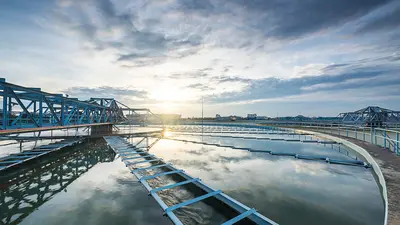Cogne Acciai Speciali is an Italian special steel producer based in the Aosta valley, a mountain valley surrounded by the highest Alpine peaks. One of the reasons why the steelmaking industry took hold here in 1916 was the abundant availability of water. However, even close to the ice-capped Mont Blanc, water has become a scare resource.
Frediani Salvatore is Engineering Department Manager at Cogne Acciai Special SpA: “Water was never regarded as a critical resource. Now, rainfalls have reduced, glaciers have shrunk and mountain lakes sometimes run dry. So saving and reusing water has become a must and that’s why we have teamed up with SMS group.”
The collaboration started in 2019 with the installation of a new SMS solution called Zero Solid Discharge to reduce the amount of sludge produced. In 2022, Cogne awarded us the contract to supply a new water treatment plant. During these projects, the collaborative partnership between the two companies grew stronger and stronger, and they decided to launch a research project aimed at reducing water consumption.
Water was never regarded as a critical resource. Now, rainfalls have reduced, glaciers have shrunk and mountain lakes sometimes run dry.
Removing contamination with electrocoagulation
Recirculating cooling water systems are widely used for cooling equipment and pipelines in the field of steel manufacturing. Due to the evaporation effect, recirculating cooling water usually contains a high concentration of salt and is highly conductive.
As soon as the circulating water reaches threshold concentration values, it must be discharged as blowdown water and substituted by fresh water (otherwise known as makeup water).
At Cogne, electrocoagulation tests were carried out to remove suspended, emulsified or dissolved contaminants from water by using an electrical current instead of expensive chemical reagents. It was shown that electrocoagulation reduces the need to top up makeup water and thus lowers total water consumption. The electrocoagulation equipment can be installed with only minor modifications to the setup of the water treatment plant.
Combination of cooling towers and air cooling
The evaporation-based water losses in cooling systems can also be reduced with our Combo water treatment plants (WTP). This system combines cooling towers with air coolers, where fresh air is used to dissipate the heat and is especially suitable for revamping existing water treatment plants.
Combo water treatment plants are designed for local, specific ambient conditions. They are extremely flexible, so the ideal cooling system can be chosen for each application and offer water consumption savings of up to 500,000 m3 per year. What’s more, by using an air cooler there is no evaporation inside the system, thus increasing the service life of the overall system.
Zero Solid Discharge
The first project realized at Cogne Acciai Speciali was called Zero Solid Discharge, aimed at reducing the amount of sludge from water treatment. Zero Solid Discharge is based on bioaugmentation, which means that bacterial cultures are added to speed up the degradation rate of organic contaminants.
The main advantage of this technology is the increased biological processes in the water. This reduces sludge production significantly compared to conventional water treatment systems. And the best thing about is that it requires zero CAPEX, as there is no need to modify or modernize existing systems.
We were able to warn Cogne about oil leakages from the machines, which in return saved money and helped to keep the water clean.
Jovana Gradinac, our expert for water treatment systems, monitored the tests at Cogne. “When we started, the chemical oxygen demand, which can be seen as representing the amount of organic sludge produced later in the process, was 215 mg per liter. After one week, this value could be reduced by 75% and then was brought down to a plateau of around 9 mg per liter. This lead to an enormous reduction in sludge,” Jovana Gradinac explains.
Yet Zero Solid Discharge can also be used as an early warning system. During the ongoing analysis of the water quality, parameters based on nitrogen compounds showed the presence of oil and grease in the water. Jovana Gradinac: “We were able to warn Cogne about oil leakages from the machines, which in return saved money and helped to keep the water clean.”
